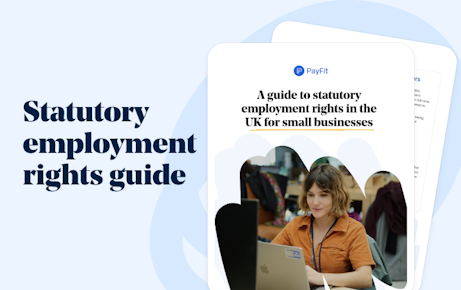Employment Rights Bill: A Full Breakdown for Employers

As the Employment Rights Bill makes its way through UK Parliament, it brings with it a host of substantial changes aimed at modernising employment practices across the UK.
Born on the 10th of October 2024, the Bill is a cornerstone of the government's "Make Work Pay" manifesto, promising to significantly alter the working landscape, both for employers and employees.
This legislative overhaul, detailed in the government's recent 'Next Steps to Make Work Pay' document, outlines 28 key reforms spanning various aspects of employment law. From enhancing worker rights to adjusting compliance requirements for businesses, these changes are designed to support fairer, more equitable workplaces.
Most of these changes aren’t scheduled for implementation until 2026. However, preliminary consultations are getting underway in 2025. If you’re a company owner or operator, then understanding these changes and what they mean is crucial for your business.
Let’s take a deep and comprehensive dive into the proposed changes of the 2024 Employment Rights Bill, as well as outline some clear, actionable insights to help you navigate this new legal terrain and get ready for the reforms to come.
Unfair dismissal and probationary periods
Under current employment law, employees need to work for your company for at least two years - only then are they granted the right to unfair dismissal. On top of this, there are no rules pertaining to probationary periods.
The proposed legislation will give employees the right not to be unfairly dismissed from the very start of their employment (without the current two-year requirement).
The dismissal process is to be simplified and will involve an "initial period” (the government is proposing nine months as a starting point for discussions). This process will also likely include a review meeting where employees can address their concerns with support. Dismissals relating to performance, conduct, or legal issues - these will all be covered ( with redundancies being the exception). Finally, the whole process will need to conclude within three months after the initial period.
It’s likely that extensive consultations will shape the final regulations, focusing on the duration and procedures of the initial dismissal period as well as any associated compensation measures.
Redundancy and restructuring
More restraints on ‘fire and rehire’
This tactic has been legal for a while now, though the government recently implemented a code of practice in the hopes of tempering its use. The practice is increasingly viewed as risky - both from a reputational and industrial relations perspective.
The new Employment Rights Bill aims to substantially limit employers' ability to use fire and rehire tactics to alter employment terms. Under the Bill, dismissals would be automatically unfair if they result from an employee's refusal to accept changed terms or the employer's intention to hire someone else under different terms for a similar role. An exception may apply if an employer faces financial challenges that threaten their business’s continuity.
Collective redundancy consultation
On top of this, the government is proposing changes to how companies conduct collective consultations on redundancies. Currently, if you’re looking to make 20 or more redundancies ‘at one establishment’ within 90 days, you must go through a process of collective consultation. If you don’t comply, then your employees can claim a protective award, amounting uto p to 90 days' pay.
While there is no suggested change to the number of redundancies that can trigger consultation, policymakers are recommending removing references to ‘at one establishment’, which means employers would need to count redundancies across all sites/workplaces. They’ve also already consulted on increasing the maximum protective award to 180 days of pay or an uncapped amount, as well as the ability for employees to claim interim relief.
The outsourcing of TUPE
TUPE, or the Transfer of Undertakings (Protection of Employment) Regulations, protects employees' terms and conditions when a business or service provision is transferred between employers. In this scenario, discrepancies can arise in the terms and conditions ex-public sector employees can work on versus private sector employees after the transfer of public contract.
Labour’s Employment Rights Bill looks to address these disparities in conditions between incoming private sector employees and existing public sector staff in outsourcing scenarios, ensuring equitable treatment across both groups. Detailed regulations and consultations on TUPE's application are scheduled for 2025, reflecting ongoing efforts to refine employment protection laws. These reforms are expected to be implemented around 2026, although the exact timing remains uncertain.
Zero hours contracts and predictability
Restricting ‘exploitative’ zero-hours contracts
The latest legislative proposals aim to address the use of zero-hour contracts without outright banning them. Instead, the Bill introduces measures to mitigate potentially exploitative aspects by ensuring workers on such contracts or those with minimal guaranteed hours have a right to more predictable and stable working conditions.
The right to guaranteed hours
Specifically, the Bill mandates that employers offer guaranteed hours to workers whose actual working hours exceed the contractual minimum over a designated 12-week reference period. This offer must align with the hours worked during that period, although the specifics regarding the working pattern and the duration for which the offer remains valid are yet to be detailed in subsequent regulations.
And to reasonable notice for shifts
Additionally, the legislation will introduce a right to reasonable notice for shifts, ensuring workers know their schedules in advance. Employers will also be required to compensate workers for last-minute changes or cancellations of shifts, with the specifics of this compensation to be outlined.
While these provisions initially exclude agency workers, the government is considering extending these rights to them as well, with consultations ongoing. The detailed application of these rules, including definitions of what constitutes a 'low-hours contract' and the conditions under which these rights apply, will be fleshed out in further legislative updates.

Flexible working and work-life balance
Improvement to flexible working rights
Currently, employees can request flexible working arrangements from day one of employment, but employers can refuse these requests based on one of eight specified business reasons.
The latest legislative updates aim to bolster flexible working rights within the UK. The penalty for not adhering to the flexible working regulations remains capped at eight weeks’ pay, up to £5,600. The eight business reasons employers can draw on for refusal change also won’t change.
However, the Employment Rights Bill mandates that any refusal of such requests must be reasonable and requires employers to provide a written explanation explaining why they believe their refusal to be reasonable. It’s worth noting that there is no plan for the eight business reasons for refusal to change.
The right to ‘switch off’
On a separate note, the government plans to introduce a statutory Code of Practice to establish a 'right to switch off,' addressing the need for employees to disconnect from work outside of business hours, with consultations on this expected in 2025. Further draft regulations may also outline necessary steps employers must take before denying a flexible working request, aiming to make flexible working more accessible and fairer across the board.
Diversity, discrimination and pay reporting
Gender Pay Action Plans
Currently, UK employers with 250 or more employees are required to publish annual gender pay gap reports. While there is no mandate to publish action plans to address these gaps, many companies volunteer to do so.
With Labour’s Employment Rights Bill comes a significant shift, requiring these employers to publish "equality action plans," which will include specific strategies for closing the gender pay gap. The new regulations will also establish penalties for non-compliance. Drafting of these regulations is underway, with further consultations expected to refine the details, including the frequency of plan publication, which will not exceed every 12 months.
Enhanced Reporting for Contract Workers
Existing rules require large employers to publish gender pay gap reports based on data from a specific snapshot date. The upcoming regulations will expand these requirements to include the identification of contract workers' providers or employers. That being said, the inclusion of contract workers' pay data in gender pay reports won’t be required.
Strengthening Anti-Harassment Measures
Since the 26th of October 2024, employers have been forced to take “reasonable steps” to prevent workplace sexual harassment. The new Bill will only strengthen this demand that employers take "all" reasonable steps to prevent both sexual harassment and harassment from third parties. Employers will be liable unless they can demonstrate that all reasonable preventive measures were taken. The specifics of what constitutes "reasonable steps" will be defined in the legislation.
The Bill also aims to clarify the legal protections for whistleblowers. In other words, sexual harassment will be considered a qualifying disclosure, provided the case meets the public interest criteria and other conditions for protected disclosures.
Addressing Dual Discrimination
Although the Equality Act 2010 includes provisions for "combined discrimination," this has not yet been activated, and the current Bill does not address it. Future reforms could potentially activate these provisions as part of broader discrimination law enhancements.
Future Legislation on Pay Gaps and Equal Pay Rights
While the current Bill does not address ethnicity or disability pay gap reporting or the extension of equal pay rights to characteristics other than sex, these issues are slated for inclusion in the forthcoming Equality (Race and Disability) Bill.
The government plans to consult on this legislation sooner rather than later, with a draft Bill expected for pre-legislative scrutiny within the current parliamentary session. Additionally, a new regulatory enforcement unit for equal pay has been proposed, likely to be part of the upcoming Equality (Race and Disability) Bill.

Employee representation and voice
Trade Union Access Rights
At the moment, trade unions don’t have a right to access workplaces for recruitment or organisation; that is, unless an employer has agreed to open their doors to them, or has been ordered to do so by the Central Arbitration Committee (CAC).
The Employment Rights Bill proposes to grant trade unions much broader rights to access workplaces, whether for recruitment, organising, or collective bargaining (excluding industrial action). This means businesses will either have to negotiate enforceable access agreements or face a CAC order. The assumption will be that union access shouldn’t unreasonably interfere with business operations.
Once the bill has passed, additional legislation will detail what the statutory process for access requests should be, along with criteria for CAC refusals and default access conditions. Maximum financial penalties for non-compliance will also be consulted upon.
Reforms to Statutory Union Recognition
When it comes to statutory recognition, unions must demonstrate that at least 10% of a bargaining unit are members, with a majority likely in favour. Recognition requires either 50% membership within the unit or favourable results from a workforce ballot.
The Bill aims to lower these recognition hurdles. It will eliminate the 40% voting threshold and potentially look at reducing the membership requirement to 2%. Unfair practice restrictions will also be expanded to involve earlier stages of the recognition process and prevent dilution of union support through new hires.
Collective Grievance Process and Union Rights Notification
Though the Bill does not address collective grievances directly, the government has plans to enable the raising of collective grievances with ACAS.
While there are no existing mandatory grievance procedures, there are individual grievance rights. For instance, union representation is allowed at hearings. Employers must also provide a written statement of employment particulars, which includes collective agreement details.
The government will conduct a separate consultation on this. At the same time, the Bill will require employers to explicitly inform workers of their right to join a trade union.
Repeal of Restrictive Trade Union Laws and Introduction of New Protections
The Strikes (Minimum Service Levels) Act 2023 and Trade Union Act 2016 impose significant restrictions on strike actions and union activities.
The new Employment Rights Bill will repeal most of these restrictions, enhancing union freedoms. It also introduces protections against detriments for participating in protected industrial actions and establishes roles for union equality representatives with rights to paid time off for duties related to promoting workplace equality.
This legislative overhaul marks a significant shift towards strengthening trade union rights and simplifying unionisation processes, reflecting a broader commitment to enhancing worker representation and fairness in employment practices.

Family rights
Protection for maternity returners
Under current legislation, women in redundancy situations who are pregnant, have recently given birth, or are within 18 months post-partum must be offered suitable alternative employment if available.
The Bill will look to extend these protections to cover other types of dismissals during pregnancy and maternity leave. A six-month return-to-work period, as well as other forms of family leave such as adoption, shared parental, neonatal care, and bereavement partners' paternity leave, will also be reviewed. The specifics will be detailed in upcoming regulations, which are expected to restrict dismissals in these circumstances, barring specific exceptions.
Statutory Bereavement Leave
Currently, statutory bereavement leave is only mandated for parents following the death of a child under 18 or a stillbirth after 24 weeks of pregnancy, alongside unpaid time off for family emergencies.
The Bill introduces a day-one right to at least one week of bereavement leave for employees, applicable to losses beyond just children, with the precise relationships covered to be specified in future regulations.
Additional regulations will outline the full scope and details of this new bereavement leave entitlement.
Parental and Paternity Leave Reforms
Parental leave currently requires one year of employment for eligibility, whereas paternity leave requires 26 weeks of employment, assessed 15 weeks before the expected week of childbirth.
The Bill seeks to remove the length of service requirement for both parental and paternity leave, making these rights accessible from day one of employment.
Furthermore, the Bill will adjust the interplay with shared parental leave, allowing employees to claim paternity leave and pay even after taking shared parental leave.
Review of Parental and Carer’s Leave
Acknowledging that the existing parental leave system may not adequately support working parents, the government plans a comprehensive review. This review will also explore the potential introduction of paid carers' leave.
These reviews are slated as long-term reforms, with expected commencement in 2025 and beyond.
Overall, the UK Employment Rights Bill introduces significant enhancements to family-related employment rights in order to provide greater support and flexibility for employees during critical life events.
A Menopause action plan
Currently, there are no specific obligations for employers regarding proactive measures for employees experiencing menopause.
The Bill mandates that employers with 250+ employees include their plans to tackle menopause within broader Equality Action Plans. These plans must be published annually, with penalties for non-compliance specified in upcoming regulations. Details on these requirements will be established in the drafting and consultation phases of the regulations, which are expected to occur soon.

Statutory Sick Pay Reforms
Statutory sick pay (SSP) currently starts from the fourth day of sickness, with eligibility dependent on earning above the lower earnings limit of £123.
The Bill proposes SSP to be payable from the first day of sickness and removes the lower earnings limit, making SSP accessible to all eligible employees from day one. Additionally, it includes provisions for the first three Qualifying Days of sickness.
Following a recent consultation, adjustments to the SSP rate for low earners are expected to be finalised and implemented as the Bill is amended.
Simplifying Employment Status
The UK currently operates under a three-tier system of employment status, categorising individuals as self-employed, workers, or employees.
The government has proposed a shift the entire system to one that’s two-tier, eliminating the distinction between 'employees' and 'workers'. This change is not part of the current Bill but is discussed in the Next Steps document (and will likely be consulted upon no earlier than 2025).
Pay and tax
National Living Wage and Minimum Wage Adjustments
Every year in April, the National Living Wage (NLW) receives an adjustment. This is based on recommendations from the Low Pay Commission (LPC). The NLW also doesn’t cover those under 21. Instead, a separate, lower rate is paid to those aged 18-20.
While not addressed directly in the Bill, the government has instructed the Low Pay Commission to consider the cost of living for the 2025 recommendations and to work on narrowing the pay gap between the NLW and wage rates for 18-20-year-olds.
Ban on Unpaid Internships
The legal status of interns remains ambiguous, with no clear definitions for 'internship' or
The government has committed to banning unpaid internships, with a Call for Evidence to be launched soon.
Enforcement
Extension of Tribunal Claim Deadlines
Generally, it’s understood that tribunal claims must be filed within three months of an incident.
However, the Bill will look to extend this period to six months for all types of claims, including discrimination and unfair dismissal. The exact date when the new time limits will take effect is still unclear.
Creation of the Fair Work Agency
Finally, in order to ensure strong enforcement of all these and future employment rights, the Bill proposes the creation of a Fair Work Agency. This new public authority will consolidate existing enforcement functions and introduce new ones, such as holiday pay policy enforcement.
The agency will have the power to issue civil penalties and mandate employer compensation, though it’s expected it will take several years for the agency to be fully up and running.
Get ahead of the legislation
There you go - an (ultra) comprehensive overview of the UK Employment Rights Bill and what it entails for employers and their people!
The law has always been evolving, of course. However, with so many of these reforms coming into law next year, there will be a lot more to juggle if you’re a business owner (especially if you have a growing team).
One way you can get ahead of this legislative wave? Invest in a good payroll software. Ours is HMRC-recognised and can keep up with even the most complex legislation changes and compliance requirements. Book a tailored demo to find out more.








